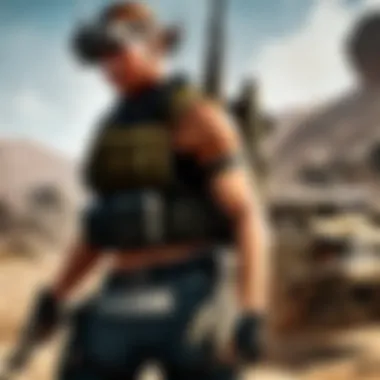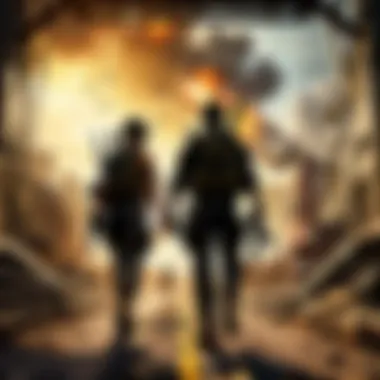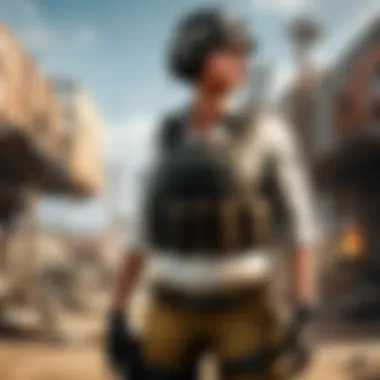Finding the Right Gaming Partner in Call of Duty


Intro
Finding the right gaming partner in Call of Duty can feel a bit like hunting for a needle in a haystack, especially with the ever-evolving dynamics of online multiplayer gaming. While some players may dive into matches solo, the journey often turns out to be much sweeter when you have a compatible teammate by your side. The imbalance of skills or communication styles can ruin an otherwise enjoyable experience. So, what do you need to consider when seeking that ideal gaming companion?
First, there’s the importance of compatibility in gameplay. You might be the cautious type who loves strategy, while your potential partner is a run-and-gun player who charges in head-first. It’s crucial to identify a match in your gaming styles to not only improve your chances of winning but also to enhance the overall fun of your sessions.
Communication Dynamics
Then, let’s talk about communication. This isn’t just about callouts during an intense firefight. It’s also about how you both interact outside the battlefield; do you engage in casual chat that enhances camaraderie? Do you share the same humor or gaming jargon? Engaging in discussions about strategies, sharing opinions on game updates, or even just laughing off a miss can build a stronger bond.
Shared Goals
Also, having shared objectives takes things a step further. Are you both striving to climb the ranks promptly, or is winning just about having fun for you both? Understanding what you both want from the game can set clear expectations and help avoid frustration.
Ultimately, this article aims to provide insights into not just finding a suitable partner but fostering a relationship that elevates your gaming experience. Dive in as we explore strategies for connection, the platforms available to meet fellow players, and the methods you can employ to ensure meaningful alliances.
As we navigate through this guide, keep in mind that gaming relationships can evolve, much like the game itself and its frequent updates. Join us on this journey to cultivate a gaming partnership that not only enhances your performance in Call of Duty but also enriches your time spent in battle.
Understanding the Gaming Landscape
In the realm of video gaming, particularly in multiplayer scenarios like Call of Duty, grasping the broader gaming landscape is vital. This understanding sets the stage for finding a compatible partner, crafting stronger teams, and maximizing enjoyment. When entering the fast-paced battlegrounds, many players neglect to take a step back and assess not only their personal gaming skills but the entire environment in which they are playing. Knowing the landscape means understanding game mechanics, player behavior, and evolving trends in gaming.
One significant aspect is the evolution of multiplayer gaming itself. Over the years, gaming has transformed from simple, solitary adventures into complex, interconnected experiences. Players must now navigate not only in-game dynamics but also the social and technological advancements that shape how we interact with one another. Understanding this backdrop informs how players approach their partnership searches.
The Evolution of Multiplayer Gaming
The roots of multiplayer gaming can be traced back to the cooperative gameplay dynamics of early titles. Players would huddle around a single console or connect via local area networks, forming teams to conquer challenges together. As technology progressed, online gaming exploded, bringing with it a myriad of players from various backgrounds.
Notably, games like Call of Duty have marked the shift from purely collaborative experiences to more strategic and competitive setups. Fast-paced matches require not only excellent reflexes but also a nuanced approach to communication and strategy. The rapid evolution of gaming technologies, such as high-speed internet and immersive graphics, has changed the landscape fundamentally. Now, gamers can join forums on platforms like Reddit or Facebook to strategize, discuss tactics, or simply find partners who share a similar ethos.
The Role of Team Dynamics in Call of Duty
Team dynamics play a pivotal role in the effectiveness of strategies within Call of Duty. Success is often dictated by how well players mesh with one another. Each team member brings a unique play style, skill set, and understanding of the game. Recognizing and valuing these differences can lead to heightened performance. In some situations, teams must lean into their strengths while compensating for each other's weaknesses. Players who avoid the common trap of homogenized tactics tend to find greater success.
An interconnected team thrives on effective collaboration, where players anticipate each other's moves. Situational awareness is essential, as Call of Duty matches can pivot sharply depending on the unexpected circumstances that arise. Thus, appreciating player dynamics—be it aggression, defense, or strategic gameplay—is necessary for any gamer seeking to cultivate a winning environment. Emphasizing roles within a team and understanding how each contributes to overall goals can foster not only better gameplay but also stronger, more fulfilling partnerships.
The Importance of Compatibility
Finding the right gaming partner in Call of Duty isn't just about skill levels or the type of weapon you wield; it's about compatibility. A mismatch in styles can sink a game faster than a well-placed grenade. Compatibility affects not just how you play, but also how you communicate, strategize, and ultimately enjoy the experience together.
Great partnerships in gaming often hinge on shared objectives and play styles. If you prefer to rush into action while your partner favors a more stealthy approach, expect some friction. This misalignment can lead to frustration, with each player feeling that their contributions are undervalued or misunderstood. Finding someone whose gaming mindset mirrors yours can significantly enhance the experience, adding coherence to the tactics employed and making every match feel more satisfying.
In addition to aligning play styles, compatibility contributes to overall team morale. A group of players who click well often communicates more effectively. When everyone understands each other's roles and how best to support one another, the gameplay becomes seamless. This harmony can be the difference between triumph and defeat. Moreover, having compatible partners means you can discuss strategies in a way that makes sense to everyone, fostering an environment where ideas flow freely.
Ultimately, the benefits of prioritizing compatibility go beyond immediate gameplay. A strong partner connection often leads to lasting friendships, which can transform gaming from a solitary pursuit into a rich social experience. When you find someone who gets you, the lobby doesn’t just feel like another battlefield; it becomes a shared space for creativity and camaraderie.
"A cohesive team can turn even the most difficult challenges into opportunities for winning streaks."
When seeking a gaming partner, remember: finding that right fit allows for a gameplay experience that not only meets but exceeds expectations.
Identifying Your Play Style
To find a compatible partner, first, you must understand your own play style. Are you a lone wolf who thrives on action-packed adventures? Or do you take a more calculated approach, preferring to plan every move? Recognizing these traits can help you narrow down who might sync well with your gaming habits.
- Aggressive Players: If you jump headfirst into engagements, look for partners who appreciate a fast-paced game.
- Strategic Players: Players who lean toward strategy often do better with those who have a similar vision to thwart opponents.
- Support Roles: If you enjoy providing cover for others or playing a more supportive role, find teammates who value patience and strategic positioning.
By identifying these styles before connecting with others, you set a clear foundation for future games, ensuring that each match feels like a collaborative effort rather than a mismatched struggle.


Assessing Team Roles and Responsibilities
Once you’ve got a grip on your style, it’s time to move toward assessing what roles make up a productive team. In Call of Duty, roles span far and wide, from snipers holding long lines of sight to medics who keep everyone alive during skirmishes. Understanding how you fit into the broader picture is essential.
Consider these common roles:
- Sniper: Offers critical overwatch and eliminates threats from a distance.
- Assault: Engages the enemy head-on, often acting as the primary front-line soldier.
- Support: Provides necessary ammunition and health boosts, reinforcing team resilience.
Knowing where you excel can help you find players who are not only aware of their own roles but understand the dynamics at play within a team. During gameplay, roles often shift, and being adaptable as a player allows for flexibility, which can make or break a match.
Effective collaboration is rooted in clearly defined roles and shared responsibilities. Once you and your partner understand your dynamic, strategizing around strengths and weaknesses becomes a lighter load. In the heat of battle, the last thing you want is to be second-guessing your partner’s next move.
Effective Communication Strategies
When diving into a game like Call of Duty, the ability to communicate effectively with teammates is no small potatoes. In fact, it's a game changer—quite literally. As players coordinate strategies, exchange vital information, and respond to dynamics shifting on the battlefield, effective communication strategies carve the path to victory. This section delves into two critical facets of communication that every serious gamer should master: the role of voice chat and text communication, alongside understanding non-verbal cues.
The Role of Voice Chat and Text Communication
Voice chat in gaming has become as ubiquitous as popcorn at the movies. It allows teammates to exchange information swiftly. Unlike text-based communication, voice chat provides immediacy—a player can inform their teammate on enemy locations, weapon status, or shift strategies in real-time without breaking the action. For example, imagine your squad is cornered. A quick shout into the mic about a flanking opportunity could turn the tide, whereas typing this could cost you precious seconds.
Text communication, on the other hand, also plays its part. It allows for a more deliberate choice of words, which can be useful when outlining strategy before entering a match or when players need to maintain silence. Players can use text chat to leave hints or alerts when voice chat might be disruptive, like during stealth missions where silence is golden. However, the problem can sometimes be that typing can distract from the action, leading to some players being overly verbose. A balance between these communication forms is crucial—knowing when to use voice to communicate urgency and when to step back and let fingers do the talking via text.
Understanding Non-Verbal Cues
Non-verbal cues in gaming might not have the same flair as a traditional face-to-face conversation, but they are pivotal nonetheless. The subtle cues can manifest in gameplay, such as player positioning or timing of actions; they can say a lot without a single word being uttered. For instance, if one player is consistently taking sharp angles, it might signal that they are scoping out enemies while simultaneously hinting that others might need to provide cover.
Additionally, observing movement can indicate intent. A player suddenly sprinting away from a firefight may suggest they need backup or have spotted a greater threat. These cues become even more pronounced in games where team formations tend to be fluid. If players understand and effectively interpret these signals, they can respond appropriately, fostering better teamwork even without verbal communication.
"Effective teamwork comes when players can sense each other's intent without needing to shout it."
For more on improving communication skills specifically for gaming, you might want to check resources like Wikipedia or forums on Reddit.
Mastering these strategies puts players one step closer to finding that ideal gaming partner, enhancing both teamwork and enjoyment in every match.
Finding Your Gaming Partner
In the adrenaline-fueled world of Call of Duty, having a reliable gaming partner can mean the difference between sweet victory and frustrating defeat. As players dive into complex maps and intense modes, finding someone who complements your gaming style is vital. The hunt for the right gaming partner isn't just about playing together; it involves establishing a synergy that amplifies the gaming experience and cultivates enjoyable interactions.
The value of a compatible teammate can't be overstated. When players align not just in skill level but also in approach and mindset, it fosters an environment where strategies can evolve without conflict. Here are several elements to consider when searching for a gaming partner:
- Skill Level: Ensure both players share a similar commitment to improving and succeeding.
- Play Style Compatibility: Identify if your aggressive tactics mesh with a more defensive partner's methods.
- Communication Dynamics: This includes how you adapt to each other’s styles in voice or text chat.
When there’s a mutual understanding, wins not only inspire motivation but strengthen the bond between players. Frustration from misunderstandings or mismatched goals can become a sour note, diminishing the thrill of competition.
Online Platforms for Connecting Gamers
The digital age has given rise to various platforms that serve as hubs for gamers looking for partners. Websites and applications specifically designed to connect players are worth exploring. For instance, sites like GamerLink and Discord can be excellent starting points. These platforms offer structured ways to find others who share similar gaming objectives and styles.
Most importantly, these tools allow for filtering potential partners based on location, skill level, and even preferred game modes. Here’s how to maximize their potential:
- Create a Descriptive Profile: Highlight your play style, hours of availability, and what you aim to achieve together.
- Join Relevant Communities: Look for groups focused on Call of Duty to meet active players.
- Engage Regularly: Being visible and involved increases your chances of finding the right match.
Engaging with others on these platforms can also lead to long-term friendships beyond the game.
Utilizing Social Media for Networking
Social media provides a different lens for connecting with potential gaming partners. Whether through forums on Reddit, Facebook groups dedicated to Call of Duty, or even Twitter hashtags, these networks allow players to reach out to a diverse community.
Posting about your search for a gaming partner or participating in discussions can draw attention to your profile.


- Engagement: Respond to other players’ posts. Showing that you’re active makes it easier for others to approach you.
- Create Content: Whether it's streaming gameplay or sharing tips online, establishing a presence can attract like-minded individuals.
- Network Events: Keep an eye out for virtual meetups or tournaments, as these events often provide opportunities to find players with similar interests.
Connecting through social media not only enhances your chances of finding a partner but can also enrich your overall gaming experience. Remember, at the end of the day, building a relationship that grows within the vast arena of gaming is paramount to keep the fire of motivation burning bright.
Evaluating Potential Partners
Finding the right partner in gaming, especially in a competitive environment like Call of Duty, involves careful consideration. Evaluating potential partners isn't merely about assessing their skills; it encompasses a holistic view of compatibility on various fronts. Beyond just having a good kill-death ratio, it's crucial to factor in how well your potential teammate meshes with your gaming philosophy, communication habits, and strategic thinking.
When you embark on this evaluative journey, think about what you value in a partner. Is it their tactical prowess, or perhaps their ability to uplift team morale? Many gamers experience frustration if their partner constantly dismisses strategies you deem important. Hence, evaluating partners right from the outset can save you countless hours of time and energy, allowing you to focus on enjoying the game.
Conducting Trial Games
Trial games can serve as an informal yet vital method for evaluating potential partners. These practice sessions enable you to gauge not just the gameplay skill of your companion, but also their adaptability in real-time situations.
Here’s what to consider during these trial games:
- Playing Styles: Observe how they approach combat. Are they aggressive, going in guns blazing, or do they prefer to hang back and assist with sniping? Your styles should complement each other rather than clash.
- Communication: Are they quick to call out enemy positions or strategies? Effective communication is a game-changer; you don’t want to be left in the dust while they’re strategizing.
- Problem-Solving: How do they react during crucial moments? A partner who panics when things go south might not be the best match for you. Look for someone who remains calm and assesses their options.
- Adaptability: Pay attention to how they adjust their playstyle when circumstances change. A flexible approach can often lead to victory even against tough odds.
Assessing Attitude and Commitment
Beyond gameplay skills, you should weigh the attitude and commitment of potential partners. A good attitude can mitigate frustrations during intense matches. Here are a few points to consider:
- Positive Mindset: Is your potential partner upbeat even when losing? An optimistic player can help cultivate a supportive atmosphere, which can make challenging games more enjoyable.
- Level of Commitment: What are their gaming goals? If they aim for competitive play while you just want to chill, you might find a mismatch. Ask about their expectations regarding time spent in-game and improvement.
- Respect for Others: Observe how they treat other players. Team players who respect their teammates and opponents foster a culture where everyone can thrive, enhancing your overall gaming experience.
Ultimately, evaluating potential partners is about ensuring they meet your needs and can contribute to a rewarding gaming environment. This assessment process is more than just numbers; it's a blend of personality and skill set that will influence your journey in Call of Duty. The right partner can make all the difference between a mundane grind and an exhilarating adventure in the battlefield.
Building Trust and Rapport
In the realm of gaming, especially in a competitive environment like Call of Duty, building trust and rapport is a cornerstone to establishing a successful partnership. The complexities involved in multiplayer gaming call for a level of camaraderie that enhances both the experience and the performance of the team. A strong bond between gaming partners can lead to a more enjoyable and productive gaming experience, making it essential to focus on this aspect.
Trust involves reliability, where players can depend on one another to execute strategies and communicate effectively. When a player feels trusted, they are more likely to take risks or make bold moves, knowing their teammate will have their back. Conversely, a lack of trust can create tension and hesitancy. Forming this bond can be cultivated through shared experiences and consistent interaction.
Moreover, rapport encourages open lines of communication, which is vital during high-pressure gameplay. When teammates are comfortable with each other, they are less likely to misinterpret instructions and more likely to support one another, especially in challenging situations. Below, I’ll delve into the two primary components of building trust and rapport while gaming.
The Value of Shared Experiences
Shared experiences hold immense weight in creating trust within a team. When partners play together frequently, they start to understand each other’s tendencies, strengths, and weaknesses. This understanding can be likened to a dance; when partners move in sync, they create a beautiful performance. Here are some key ideas to consider:
- Playing Regularly: Commitment to regular gaming sessions helps in building familiarity. The more time you spend playing together, the more you understand your partner's gameplay style.
- Completing Challenges: Engaging in objectives or challenges together gives players a common goal. Completing objectives, whether they are in-game missions or achievements, intensifies the bond formed.
- Sharing Triumphs and Defeats: Going through victories and losses side by side fosters a sense of unity. Celebrating successes and analyzing failures together solidifies the partnership.
This bonding is not merely functional; it enhances the gaming experience, making it more enjoyable and cohesive. Trust is not built overnight, but with shared experiences, it can grow steadily over time.
Encouraging Positive Interaction
Another vital component of building trust and rapport lies in encouraging positive interactions. This involves not just gameplay, but also how partners communicate and support each other. Positive interactions can make the gaming experience feel less stressful and more enjoyable, thereby fostering a productive environment. Here are some strategies:
- Use Constructive Feedback: Instead of criticizing mistakes, partners should provide constructive critique. This helps players learn and improve without feeling demoralized.
- Celebrate Small Wins: Recognizing even the smallest achievements can boost morale. A simple acknowledgment of a good play can reinforce positive behavior.
- Practice Active Listening: Truly listening to a partner’s thoughts and strategies creates a sense of respect. Encouraging an atmosphere where everyone’s opinions are valued can lead to a stronger team dynamic.
- Keep the Mood Light: While high-stakes play can be tense, infusing light-hearted moments, shared jokes, or friendly banter keeps interactions positive.
Such interactions act like glue, binding players together and facilitating a seamless flow of communication. Setting a positive tone often yields better teamwork, encouraging each player to shine in their respective roles.
Trust, when cultivated through shared experiences and positive interaction, is what transforms mere gaming partners into close allies in the field of battle.
The End
Ultimately, the significance of building trust and rapport cannot be overstated in the pursuit of an ideal gaming partnership. Creating a foundation based on shared experiences and encouraging positivity fosters a more dynamic and effective gameplay environment. As you move through the intricacies of Call of Duty, remember that at the core of every successful team is a bond built on trust and companionship.
Adjusting to Different Styles
In the realm of multiplayer gaming, particularly in tactical shooters like Call of Duty, the ability to adjust to different playing styles within your team becomes crucial. This adaptability can mean the difference between a champion squad and one that falls apart under pressure. You might think of gaming as a dance, where everyone must be in sync to pull off the right moves. If one partner is doing the cha-cha while another is going for a slow waltz, well, you’re in for a rough time.


Flexibility in Strategy and Tactics
Flexibility in strategy isn’t just a buzzword; it’s a principle that can enhance your team's potential. When playing Call of Duty, each gamer typically brings their own flavor to the battlefield. Some might prefer a head-on assault, diving into the fray with adrenaline pumping. Others might hang back, covering allies with precision sniping or supporting with strategic tactical drops.
Without flexibility, these contrasting styles can clash. Think of it like a well-mixed drink; too much of one ingredient can spoil the whole thing. To keep your squad running like a well-oiled machine, consider the following:
- Adapt to Your Partners: Spend time understanding how your teammates operate. If one prefers aggressive flanking, support that strategy by providing cover fire or distractions.
- Rotate Roles: Regularly swapping roles helps everyone understand the game from different perspectives. This can not only enhance team empathy but also bolster overall strategy in the long run.
- Communicate Strategically: Discuss tactics before a match. Instead of sticking to rigid plans, hold tactical discussions, allowing players to pivot based on real-time conditions.
This flexible approach isn't just beneficial; it's essential for maximizing team effectiveness in the fast-paced environment of Call of Duty.
Navigating Conflicts and Disagreements
As with any dynamic group, conflicts and disagreements may arise. Whether it’s over strategy, decision-making, or even just how to react to an enemy ambush, managing these conflicts constructively can not only save a game but also strengthen team bonds.
When disagreements pop up, here are some ways to navigate through them:
- Stay Calm and Open-Minded: Emotions can run high during heated matches. Taking a step back to breathe and encouraging open dialogue among team members can help defuse tension.
- Acknowledge Different Perspectives: Each player sees the game differently. Listening to your teammates’ viewpoints can provide insight that might not have crossed your mind.
- Establish a Conflict Resolution Protocol: Before the game starts, establish ground rules for how to handle disputes. This not only prepares players for resolving issues but creates a culture of respect and collaboration.
Keeping the lines of communication open, while also providing space to vent frustrations, can foster a more united and effective team. Remember, navigating conflict doesn’t mean sidestepping it; it’s about finding mutual respect and understanding.
"Games are won not just by skill but by the harmony in teamwork. Adapt and communicate, and victory can be yours."
In sum, adjusting to diverse playstyles in Call of Duty isn’t merely a matter of preference; it’s a strategic necessity that can elevate your entire team’s performance. The key lies in understanding, adapting, and navigating through challenges together.
The Impact of Team Synergy
In the intricate world of multiplayer gaming, particularly in Call of Duty, the idea of team synergy plays a pivotal role in how players interact, compete, and ultimately succeed. This concept is not merely about having a group of skilled players; rather, it encompasses how effectively those players utilize their individual talents to achieve a common goal. When players work in harmony, the outcome often exceeds what each member could have achieved alone.
Maximizing Strengths and Minimizing Weaknesses
Every player brings their own unique set of skills to the table. Some may excel in marksmanship, while others shine in strategy or team coordination. Understanding these strengths and weaknesses is crucial for forming a balanced team. For instance, imagine a scenario where one player is adept at long-range sniping while another excels at close-quarter combat. By aligning their roles correctly, such as placing the sniper in a vantage point while the close-combat specialist pushes forward, the team can capitalize on their respective strengths.
A seamless mix of different skills can create a powerful synergy. Teams that focus on maximizing their strengths often manage to hold territory, control objectives, and respond adeptly to enemy movements. Players should communicate openly about their capabilities and preferences, ensuring they are placed in roles that resonate with their skills. This way, they can bolster team performance and ensure that their weaknesses are shielded effectively. In this light, team synergy becomes the backbone for victory, as it reinforces group cohesion and purpose during gameplay.
Fostering a Supportive Environment
A supportive environment within a gaming team can make all the difference in enhancing performance and enjoyment. This goes beyond technical skills; it involves creating a space where members feel comfortable sharing ideas, voicing concerns, and providing each other with constructive feedback.
Encouraging a culture of teamwork might involve simple gestures, such as celebrating small victories or recognizing individual contributions. Players might take time during matches to reassure a teammate after a tough moment or applaud a good play. Such practices can boost morale, making gamers more inclined to communicate and strategize effectively during high-pressure situations.
It's essential to foster trust among teammates. When players believe in each other, they are more willing to take risks, experiment with strategies, and cover for one another when things don't go according to plan. Failing to build this culture of support can lead to frustration, decreased performance, and in some cases, team disbandment. Ultimately, a supportive environment is characterized by mutual respect and open dialogue, setting the stage for improved teamwork and, consequently, better game outcomes.
"In multiplayer gaming, synergy isn't just beneficial; it’s essential for success. It’s the glue that holds effective teams together."
To sum up, understanding the impact of team synergy unveils a vast potential in any group of gamers. By maximizing each member's strengths while fostering a supportive atmosphere, players can cultivate a team dynamic that not only enhances their chances of winning but also makes the gaming experience much more enjoyable.
Ultimately Finding Your Ideal Match
Finding an ideal gaming partner in Call of Duty is more than just teaming up; it's about establishing a connection that enhances your experience and performance in the game. It's like trying to find a needle in a haystack, but the right match can make all the difference in how you play and enjoy the game. The focus is to forge relationships that lead not only to victories but also to personal growth and enjoyment.
Persistence and Patience in the Search
It’s often said that good things come to those who wait, and this rings particularly true when you're on the hunt for a gaming partner. The journey starts with understanding that finding the right companion won’t happen overnight. You may need to wade through a sea of gamers, each with differing play styles and personalities.
To sharpen your search:
- Try various platforms and forums. Whether it's established networks like Reddit or more focused gaming communities on Discord, be open to where you conduct your search.
- Participate in matches and tournaments. Your ideal partner might be someone you meet while battling it out in a tournament or playing casually. Keep an eye out for players whose style complements yours.
- Communicate openly. When interacting with potential partners, ask questions about their gaming habits, strategies, and past experiences. Keeping a dialogue can reveal much about their suitability.
Remember: Don’t be discouraged if you don’t click with someone right away. It’s a process that demands time.
Emphasizing Enjoyment Over Competition
In the rush to climb the leaderboards and achieve high ranks, sometimes the heart of the game gets lost. Don’t forget that the primary goal is enjoyment. A partner who shares this sentiment can significantly enrich your gaming sessions. This shared mindset can be the glue that holds your partnership together.
- Set a friendly tone. Make it clear upfront that, while winning is important, having fun is paramount. This approach fosters a positive environment where both players can thrive.
- Create shared goals that emphasize fun. Rather than just focusing on victories, think of objectives like completing specific missions together or experimenting with different strategies just for the thrill.
- Encourage laughter and light-hearted banter. Gaming should be a break from reality, not a source of stress. Support each other in having laughs as you navigate the challenges within Call of Duty.



